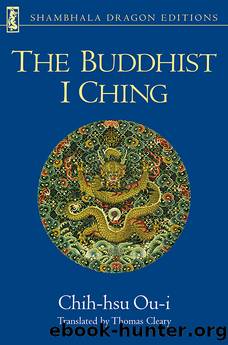The Buddhist I Ching by Chih-hsu Ou-i

Author:Chih-hsu Ou-i
Language: eng
Format: epub
Publisher: Shambhala
25. No Error
thunder below, heaven above
Freedom from error is very successful, beneficial for the upright. Denial of what is correct is mistaken, so it will not be beneficial to go anywhere.
In politics, a government that restores well-being accords with the way of heaven and is free from error. In Buddhism, a teaching that restores the true way is the same as the orthodox teaching and is free from error. In contemplating mind, on returning to original essence, truth is found and confusion is ended, so one is free from error. All of these are very successful, and beneficial for the upright.
But whether in worldly affairs or transcendental affairs, helping oneself and helping others, it is necessary to look deeply into oneself to be sure oneâs mind is free from aberration and oneâs words and deeds are not mistaken. If inwardly one denies what is correct, outwardly one will make mistakes; then one should certainly not go anywhere or do anything in this way.
THE OVERALL JUDGMENT: No errorâstrength comes from outside and becomes the master of the inside. Active and healthy, strength is balanced and responsive. Great success in what is right is the celestial command. Denial of what is correct is mistaken, so it will not be beneficial to go anywhere. Where does one go without error? How could one go anywhere without the assistance of the celestial command?
Although inherent virtues are in everyone, in terms of confused feelings they become on the contrary external. Now, if we initiate cultivation from essence, we will understand that inherent virtues are our ownâso this is called becoming the master of the inside.
Once we have initiated cultivation in accord with essence, everything we do has to accord with the essence of reality. If our thoughts, words, or deeds are not yet pure, even if we have sublime understanding, we cannot help ourselves or others. As long as we do not conform to our inherent virtues, the buddhas of the universe will not watch over usâso how could we go anywhere?
THE IMAGE: Thunder travels under the sky; things accompany with no error. Ancient kings promoted flourishing appropriate to the time and nurtured myriad beings.
In Buddhist terms, the full projection of the scope of complete enlightenment benefits people in all times; this is called promoting flourishing appropriate to the time. Planting and ripening the seeds of liberation, causing all sorts of people to naturally grow and eventually wind up at the unique reality is called nurturing myriad beings.
First yang: Going without error leads to good results.
THE IMAGE: Going without error, one attains oneâs aspiration.
This means going to respond to events based on truly genuine freedom from error. Thereby one attains oneâs aspiration, which leads to good results.
2 yin: Not plowing for the harvest, it is beneficial to go somewhere.
THE IMAGE: Not plowing for the harvest, one is not enriched.
This means aspiring only to attain enlightenment, not thinking of riches or rank. Then it is beneficial to go somewhere.
3 yin: The misfortune of no errorâa tethered cow is a gain for a traveler, a misfortune for the local people.
Download
This site does not store any files on its server. We only index and link to content provided by other sites. Please contact the content providers to delete copyright contents if any and email us, we'll remove relevant links or contents immediately.
| Confucianism | Feng Shui |
| I Ching | Jainism |
| Karma | Shintoism |
| Sikhism | Tao Te Ching |
| Taoism | Tibetan Book of the Dead |
| Zoroastrianism |
The Tao of Physics by Fritjof Capra(2276)
Human Design by Chetan Parkyn(2074)
The Diamond Cutter by Geshe Michael Roach(2062)
Feng Shui by Stephen Skinner(1941)
The Alchemy of Sexual Energy by Mantak Chia(1860)
Tao Te Ching by Lao Tzu(1842)
365 Tao: Daily Meditations by Ming-Dao Deng(1622)
Tao Tantric Arts for Women by Minke de Vos(1600)
Sun Tzu's The Art of War by Giles Lionel Minford John Tzu Sun(1541)
Sidney Sheldon (1982) Master Of The Game by Sidney Sheldon(1520)
Buddhism 101 by Arnie Kozak(1513)
Karma-Yoga and Bhakti-Yoga by Swami Vivekananda(1496)
The Analects of Confucius by Burton Watson(1436)
The Art of War Other Classics of Eastern Philosophy by Sun Tzu Lao-Tzu Confucius Mencius(1428)
Tao te ching by Lao Tzu(1366)
The Way of Chuang Tzu by Thomas Merton(1365)
The New Bohemians Handbook by Justina Blakeney(1355)
The Sayings Of by Confucius(1317)
Bless This House by Donna Henes(1272)
